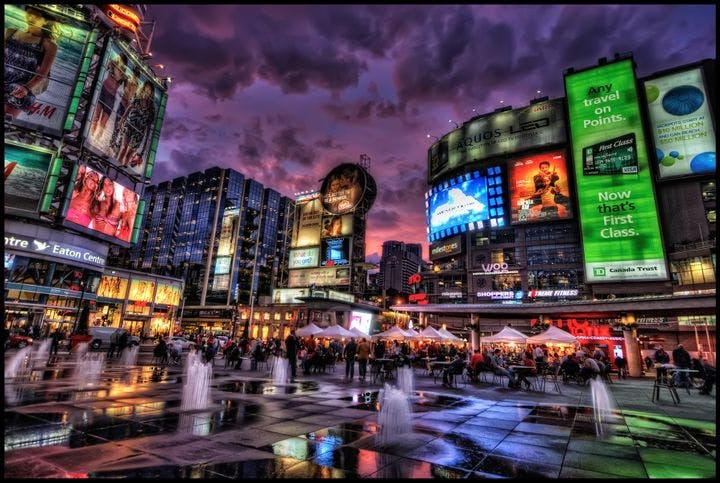Fall 2008
Mind and Matter
– Geoff Manaugh
In Concrete Reveries, writes reviewer Geoff Manaugh, philosopher Mark Kingwell offers only a glimpse of what makes him "an original thinker with provocative ideas."
That each city might have a particular psychological effect on its inhabitants, or that the very act of living in cities might entail its own brand of cognition, is not an original claim. Such lines of thinking have formed a thriving undercurrent in European thought for at least the past two centuries. Where Mark Kingwell tries to break new ground in Concrete Reveries, however, is in applying historical texts, from Walter Benjamin and René Descartes to Sigmund Freud and the novels of J. G. Ballard, to problems of contemporary city planning, including Chinese Olympic architecture and skyscraper design. In a book heavy on philosophy, Kingwell discusses boundaries, thresholds, and the multivalent borders that divide inside from out. He looks at how spatialization affects—and is affected by—historically specific styles of thinking.
Can a city be the material realization of an era of thought—and can cities retroactively inspire certain states of what Kingwell, a professor of philosophy at the University of Toronto, calls “consciousness”? The word choice here is not ideal; whereas a term such as “subjectivity” might have better communicated the changing, socially defined nature of thought, “consciousness” carries far too much baggage for use in a rigorous analysis. It becomes merely another word for the soul, and is, ironically, a holdover from another era of thought.
Kingwell’s basic line of inquiry is nonetheless exciting. When a building is added to—or, as in the case of the World Trade Center’s twin towers, violently removed from—the urban landscape, “how is your experience, and mine, altered by this new place”? Kingwell proposes a radical possibility here: that urban experience, as the “shared horizon” of humanity, can itself be politicized. In other words, what could be considered a private, internal experience—Kingwell’s “consciousness”—can be reconceived as a public event subject to political regulation, even to historic preservation. What would it mean to preserve somehow an era’s prevailing mode of thought—and is this perhaps what architecture has been doing all along? Rather than pursue these questions, which are seemingly the ultimate example of how difficult it can be to draw clean lines between inside and out, Kingwell steps away into a discussion of Descartes’ 17th-century ideas about individual self-perception.
As this example shows, Kingwell’s citations—the texts with which he aligns himself—often get in the way of the book’s promise. In fact, David Hume, Hannah Arendt, Jacques Derrida, Paul Virilio—all of the thinkers Kingwell calls upon—overshadow important questions at the heart of Concrete Reveries. Still, it is these questions that make the book worthwhile.
How does the built environment affect what Kingwell calls consciousness? In his examination of New York City’s Grand Central Station, for instance, he finds the possibility of an “expansive individualism” that exceeds the promises of more explicitly political monuments such as the Statue of Liberty. In Grand Central, Kingwell writes, “movement is everything”; it is a Romantic space that both inspires and enables a particularly American way of being. Nodes such as these within cities—New York, Shanghai, Berlin, Vancouver—deserve their own psychological catalog, their own social narrative, their own historical accounting. Pursued rigorously, this approach could offer revolutionary insights.
The irony, though, is that a book striving toward analytic radicalism comes across as remarkably well behaved. At moments it is tempting to pull Kingwell aside and assure him that many of the historical texts he trots out are relevant only insofar as scholars continue, unnecessarily, to quote them. Kingwell would have done himself a favor by sticking to the thoughts of Mark Kingwell—an original thinker with provocative ideas that, in the future, we must hope he will have the courage to explore.
* * *
Geoff Manaugh is senior editor of Dwell magazine; his blog, BLDGBLOG, can be found at bldgblog.blogspot.com. The BLDGBLOG Book is forthcoming next spring.
Reviewed: Concrete Reveries: Consciousness and the City by Mark Kingwell, Viking, 292 pp, 2008.
Photo courtesy of Flickr/Pedro Szekely
